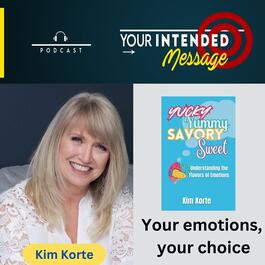
How to take control of your emotional reactions: Kim Korte
The Recipe of Emotions: Crafting Responses for Success Emotion as Sensation: How Our Past Shapes Our Emotional Responses Episode 230 (Kim is based in San Francisco) In this conversation we explore: The Connection Between Emotions and Sensory Experiences Why Emotional Awareness Matters in Both Life and Leadership Practical Strategies to Gain Control Over Your Emotions How to Avoid Being a ‘Slave’ to Your Emotions The Power of Emotional Granularity Using Interoception to Improve Emotional and Physical Awareness How to Rethink Negative Experiences Through Conscious Reframing Balancing Compassion and Empathy as a Leader Daily Practices to Connect with Your Emotions How Emotions Serve as Tools for Learning and Growth About our guest, Kim Korte: Kim Korte hosts the Flavors of Emotions podcast and is the author of Yucky Yummy Savory Sweet: Understanding the Flavors of Emotions. She offers a process to help us make sense of our feelings through the lens of a chef understanding flavors in a recipe. This unique approach to emotion management blends culinary metaphors with emotional education in a digestible format, making the complex world of feelings accessible and actionable. As a Sensory Perception and Emotion Management Strategist, she aims to help people develop creative action around how they experience the world and their emotions. Learn more about Kim and and her book https://www.kimkorte.com/ Listen to her podcast "Flavors of Emotions: https://www.flavorsofemotions.com/ ----- Excerpts from this conversation with Kim Korte: In your book, you compare emotions to food and and sensation. Food sensations and flavors. How did you come up with that connection? I learned about the theory of constructed emotions, which is a very common and probably fairly widely accepted idea that we construct our emotions using our experiences, kind of like ingredients that and a recipe. And I got this idea after reading how emotions are made, The Secret Life of the Brain, by Lisa Feldman Barrett. It was an eye popping book, and it got me to think about how if emotions are created from perceptions, then our whole world is like giving us ingredients that we use, and the recipes are everything that we've experienced previously. So we're always living today in the past, unless we're more conscious of what's going on in our current experience. That level of consciousness is what helps us to examine and change the quote, unquote recipe if it's not the right one, or if it's not working for us and the process of flavor, it's not a sense sensory system, like everything that we taste, everything we see, all of these things, these are sensory systems. And taste is a combination of sensory systems you taste with your nose, you taste with your mouth. They even have shown that what you see and what you hear like, if it's crunchy, you think it's fresh, but even music going on around you, you might think, Oh, this music isn't impacting me, but it really can impact the flavor and your experience of food, and the same is true of our emotions. Everything that we experience is a our emotions, rather are a combination of our sensory experiences. That's what influences us. So this is where I got these food metaphors and cooking metaphors. ----- Think of it like a pepper. There's different kinds of peppers, there's bell peppers, and there's jalapenos, and there's habaneros. And yet, we don't attribute hot spiciness to every single pepper out there, right? Because we've learned to distinguish the differences situationally and. Experientially of different peppers. And so the same can be true with our fears, because we tend to have this like one size fits all approach to a lot of emotions, and we we feel one emotion more than others, and we haven't allowed ourselves to recognize that fear can be like a pepper, even love can be like a pepper, and have different gradations of it, different levels of quote, unquote, heat. And with that, you are able to break down that fear into seeing it in its different states. It could be irked, could be nervous. It could be irate, you know? It could be, you know, I need to run for the door, panic. Same with love.... ----- ----more---- Your Intended Message is the podcast about how you can boost your career and business success by honing your communication skills. We’ll examine the aspects of how we communicate one-to-one, one to few and one to many – plus that important conversation, one to self. In these interviews we will explore presentation skills, public speaking, conversation, persuasion, negotiation, sales conversations, marketing, team meetings, social media, branding, self talk and more. Your host is George Torok George is a specialist in communication skills. Especially presentation. He’s fascinated by the links between communication and influencing behaviors. He delivers training and coaching programs to help leaders and promising professionals deliver the intended message for greater success. Connect with George www.SpeechCoachforExecutives.com https://www.linkedin.com/in/georgetorokpresentations/ https://www.youtube.com/user/presentationskills https://www.instagram.com/georgetorok/
From "Your Intended Message"


Comments
Add comment Feedback